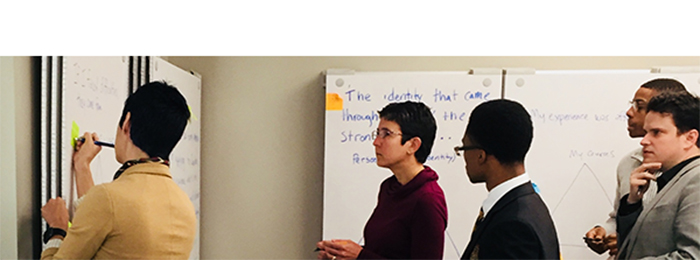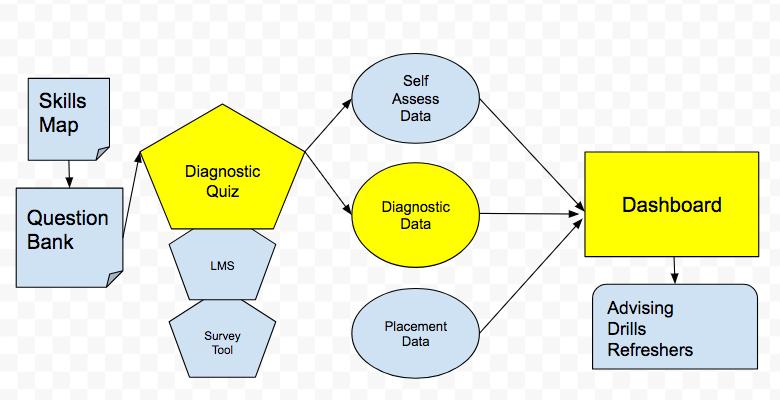To assist our students with readiness for their quantitative work across the curriculum, and to investigate the role that online resources may play in this, the Liberal Arts Collaborative for Digital Innovation (LACOL) has kicked off a multi-campus development and educational research initiative, nicknamed QLAB. The QLAB project provides a framework for creating a series of modules called Q-bits. Each online Q-bit module focuses on a particular quantitative skill or concepts and provides instructional and review content that is “wrapped” by pre/post knowledge and confidence checks, contextual guides, and applications problems in several disciplines. Read More
Tag: #project
CHIANTI – Shared Grammar Resource
The Language Instruction Working Group is currently (Spring/Summer 2018) exploring an idea for a online resource built collaborative by/for LACOL faculty and instructors that will guide language learners on foundational grammar concepts.
There is an emerging plan for collaboration toward Shared Grammar Resources for Beginning Language Students. This concept has been discussed with enthusiasm in some earlier LACOL meetings, and Carleton Professor of Classics Chico Zimmerman has drafted a proposal to articulate more of the vision – see link above and below.
Four small teams are actively collaborating across several schools on the following module topics:
- General Advice to Learners
- General advice to incoming students about language-learning at college.
- This includes some student voices on their learning experiences, but also could include some more general data/research findings on the benefits of L2 acquisition and the potential interferences of L1.
- Map of Language Learning
- An “overview” or map of the different domains that language takes in, including “grammar” broadly construed and its relevance
- Glossary of Grammar Terms
- A glossary of grammar terms with English examples; perhaps including sentence diagramming
- Phonetics and Phonology
- Phonetics/phonology module (perhaps with differing emphases depending on the target languages)
Course Sharing for Self-Instructional Language Learning (SILP)
Colleges within the consortium offer some form of guided, self-instruction of lesser-taught languages. In Fall 2017/Spring 2018, Vassar College and Williams College launched a collaborative exploration to share online, synchronous classroom-to-classroom interactions across their across their Self-Instructional Language Programs in Portuguese. Through online web conferencing, the classes on each campus shared a tutor and teaching resources for students learning practicing their Portuguese pronunciation and conversation skills.
Learning Design:
- Two one-hour synchronous sessions each week with all students and the tutors
- Up to ten hours of independent study in preparation for the tutorial sessions
Students enrolled in a Self-Instructional Language Course meet twice a week with their tutor and other students in the course. Each student is expected to prepare thoroughly for these sessions, using detailed study guides, a textbook, and multimedia materials. The focus in SILP lies on communication, not on grammatical analysis and literary study. Hence tutorial sessions are conceived as review sessions, unlike more traditional language instruction where new material is often introduced during class.
The tutor’s role is to facilitate the active use of words and structures learned by students beforehand, and to model the use and pronunciation of the language. A shared course differs from a regular course in SILP only in the addition of remote learners to the host institution’s class. All students and the tutor interact with each other in real time via videoconferencing technology. In addition, tutorial sessions are recorded and may be used for further review.
– Project lead L. Gerhardi (Vassar College)
Related Posts:
Upper Level Math & Stats Course Exchange
As one possible avenue to expanding curricular offerings for math and stats majors, partner schools of LACOL have been exploring ways to remotely share classes using hybrid/online delivery modes.
Math/Stats Pilots: In Spring and Fall of 2017, several LACOL colleges collaborated to pilot three shared course offerings for advanced mathematics and statistics:
- Putnam Problem Solving, Spring ‘17 (Prof. S. Miller, WIlliams College)
- Advanced Real Analysis, Fall ‘17 (Prof. S. Garcia, Pomona College)
- Bayesian Statistics, Fall ‘17 (Prof. M. Hu, Vassar College)
The goal of this exploration is increase the wealth and frequency of the advanced classes our students need, both for graduate study and to delve deeply in the subject.
Learning Design: For these shared courses, each professor opened their course to students across LACOL, sharing lectures, assignments and other class activities through both asynchronous (e.g. recorded lectures and screencasts) and synchronous (e. g. online problem solving sessions and office hours) means.
In these pilots, students reported positive experiences and some adjustments to learning through digital modes:
Before I took Professor Miller’s class, I was already very interested in problem-solving and participating in math competitions […] I was really excited to hear that there was a professor at Williams who was teaching a class on Putnam. I wanted to improve my problem solving skills systematically. The biggest advantage was that I could watch the videos whenever I wanted, and take classes that I otherwise could not fit in my schedule at Swarthmore. I also watched Professor Miller’s other videos, including the ones on number theory or complex analysis, to fill in gaps of my knowledge.– John Fan, Swarthmore ’19

Inclusive Pedagogies
Inclusivity in the classroom and on campus (physical and virtual) is a priority at all LACOL institutions. Liberal Arts Colleges face a growing need to diversify and align to the demographic shifts in college age populations. For this and many reasons, we must ensure that our institutions are welcoming and inclusive.
LACOL has two related initiatives underway. The first is a series of dialogues across stakeholders to share insights on institutional and classroom strategies that enhance access and inclusion. The second is a shared experiment in assessment; how might be used to gain better evidence on aspects of the liberal arts experience?
Inclusive Pedagogy Dialogues:
- Haverford Workshop (March 2018)
- Cultivating Student Leadership to Foster a More Inclusive Classroom – Amherst College (April 2019)
Innovations in Assessment with Sensemaker:
Language Skills Map & Dashboard
Faculty and Technologists from the Language Instruction Working Group are working toward a Collaborative Language Diagnostics and Refresher Framework, including a visual dashboard to help faculty and students efficiently assess language proficiencies.
Two recent workshop (see below) have recently made concrete steps toward realizing the framework, and additional steps are planned for spring 2018. For more information, contact Mike Jones, (mjones1@swarthmore.edu) or Carly Born (cborn@carleton.edu)
Related Posts:
- Language Pedagogy & Proficiency Workshop
- Language Instruction Jam 2019
- Language Skills Diagnostic Dashboard: 2018 Faculty Workshop and Pilot for French
- Language Skills Dashboard – drill down on data visualization
- Hack-a-thon Toward a Collaborative Language Diagnostics and Refresher Framework
- Language Skills Map & Dashboard




